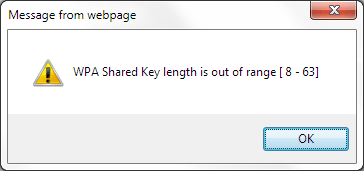One of the most common issues that my visitors contact me about is that they have difficulty saving the passphrase for their WRT54G wireless router when securing the router with WPA. Many times the problem is resolved once they use Internet Explorer instead of another web browser. Other times, however, switching browsers may not even correct the problem.
With web browsers such as Firefox and Chrome, you have the ability to install add-ins to change many settings and functions within the browser. At times, certain add-ins can interfere with the router’s administrative pages, resulting in settings not being saved or message boxes from appearing. A recent commenter in my explaining how to secure the WRT54G wireless router pointed out that there is a minimum passphrase length, but many people may not receive a popup message, which can lead to confusion and issues. For the WRT54G, the minimum length is 8 characters , and the maximum is 63 characters. When it comes to a passphrase, you should definitely go longer than the minimum of 8 characters. Let’s look at why the passphrase, and its length, is important when securing a wireless router.
Passphrase Length is Important for Securing a Wireless Router

In the past year I have gone through many of the important websites that I use, especially the financial sites, and changed the passwords for all of them. Each one has their own individual password, and each password is comprised of random characters to make it even more difficult to crack. On top of that, I also created each password to match the maximum length that the website allowed for passwords for even more protection.
After doing this, I wrote a post explain why password length is important. In that post I showed how a longer password is much harder to crack than a shorter one.
With regards to your wireless network, the passphrase you choose for your network is similar to a password for a website, in that someone will need to enter that passphrase to gain access to your wireless network. The passphrase is the major hurdle that someone needs to overcome to gain access to your network.
To ensure others can’t crack your passphrase and gain access to your wireless network, it is important to create a long passphrase – the longer the better. There are several websites that can generate random strings for you to use as a passphrase. I suggest you create such a passphrase since you can always retrieve the passphrase from your router’s administrative pages if you forget the passphrase you chose.
When choosing a passphrase always go for length rather than easy to remember. Once you connect a computer to your wireless network, the operating system can store the passphrase so you won’t need to enter it again. As I mentioned earlier, you can always log into your router and retrieve the passphrase whenever you need to use it. If you choose, there are also many ways you can store your passwords as well.

